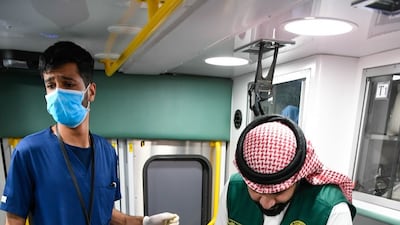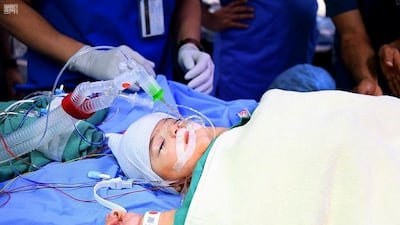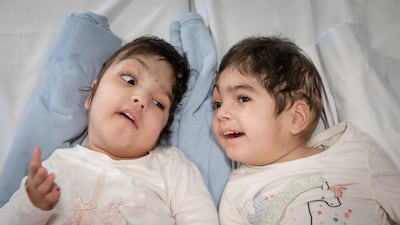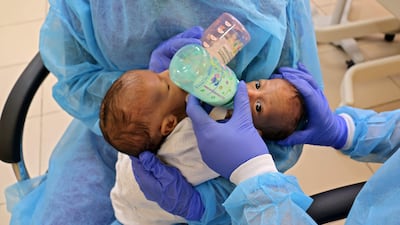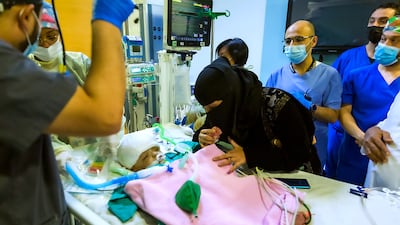Doctors in Saudi Arabia have separated Yemeni conjoined twins Mawaddah and Rahmah after their parents made a perilous 300-kilometre journey through territory controlled by the Iran-backed Houthis to seek medical care.
A surgical team at King Abdullah Specialist Children’s Hospital in Riyadh, led by Dr Abdullah Al Rabeeah, performed the operation.
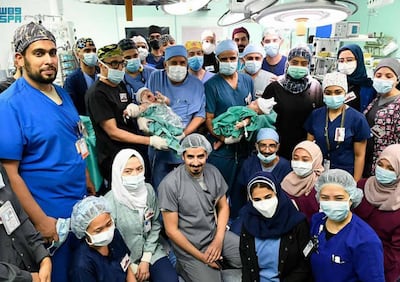
A lack of medical services and expertise to conduct the complicated surgery in Yemen means cases are regularly sent to neighbouring Saudi Arabia.
Saudi Arabian authorities sent a plane to collect the girls, who were born on March 13 at Al Sadaqa Hospital in the southern city of Aden, controlled by the internationally recognised government. The successful separation operation took place on July 28.
twins' father
To find the medical care they needed, their parents made the dangerous journey from Houthi-controlled Al Bayda Governorate.
“The moment my daughters were separated was the happiest moment of my life, and all of it thanks to the kingdom,” the twins' father, Hudhayfa Noman, told The National.
“The kingdom's efforts were great. A plane was sent to transport them to King Abdullah Specialist Children's Hospital where they received care from arrival until the success of the operation.”
Mr Noman said the surgery was organised after news of the birth was sent to the King Salman Centre for Relief and Humanitarian Action (KSRelief). From there, Royal Court approval was sought to take the case.
Muhammad Al Maqrami, the head of the Centre for Studies and Humanitarian Media in Yemen, said the treatment of conjoined twin cases is coordinated by KSRelief offices in Aden, Marib and other governorates. They arrange the transfer to hospitals in Saudi Arabia, he said.
Yemen's health sector has deteriorated during seven years of war. According to the World Bank, one mother and six children die in the country every two hours, with war the third most prominent cause of death, after heart and neonatal diseases.
KSRelief is continually involved in sending aid to neighbouring countries across all sectors. Yemen's health sector has received the largest share of aid, with $830 million spent on 342 projects over two decades.
The twins were the 52nd operation undertaken by Saudi Arabia's programme for separating conjoined twins, including patients from 23 countries.
“The support of the kingdom in the separation of conjoined twins has a long history, not only in Yemen, but in different countries in the world,” said Dr Ishraq Al Sibai, undersecretary of the Ministry of Health in Yemen’s internationally recognised government.
Muna Luqman, president of Food4Humanity, a women-led humanitarian organisation in Yemen, said Saudi Arabia takes on the cases “as part of its humanitarian work”.
“Operations to separate conjoined twins require advanced capabilities and high expertise, both of which are not available in Yemen,” she said.
This year alone, two sets of Yemeni conjoined twins were successfully separated in Saudi Arabia, allowing three healthy children to live. One of the children died the day after their separation surgery.
Ms Luqman wants humanitarian organisations to increase their support for maternal, child and reproductive health projects in the war-torn country.
Lack of information
Dr Al Sibai said there have been four known cases of conjoined twins in Yemen since 2016, with three of them separated with the support of KSRelief.
“We do not have accurate statistics on the number of deaths of conjoined twins since these are counted together with other neonatal fatalities,” she said.
Dr Al Sibai does not believe the number of conjoined twins in Yemen requires “special measures”.
“But ensuring the safety of Yemeni families and the health of their children is a priority for the ministry, and many community awareness campaigns on reproductive health have been carried out,” she said.
One case is currently stuck in an area controlled by the Iran-backed Houthis, who are refusing to allow the family to leave. “If the family manages to reach the city of Aden, all facilities will be provided to take them to Saudi Arabia for surgery,” she said.
Houthi health spokesman Dr Anis Al Asbahi refused to provide information on the number of cases of conjoined twins in their area of control.
Epidemiologist Dr Sahel Al Eryani said conjoined twin cases were rare in Yemen, with no genetic reason for them. Yemeni paediatrician Dr Mayassa Dammaj said cases of conjoined twins could not be explained by maternal behaviour, trauma, virus, disease, environmental problems or any other factors.
“Conjoined twins occur when the foetus separates only partially in an early stage of development to form two separate bodies and can share one or more internal organs,” Dr Al Eryani said.
“Many twins die shortly after birth, but with the development in surgical techniques, survival rates have improved.”
The success of operations depends on how the twins are conjoined, the number of vital organs shared and the expertise of the surgical team. “Separation surgery in Yemen can only be done in some cases in which the twins do not share any organ,” he said.
More complicated cases are sent to Saudi Arabia's King Abdullah Specialist Children's Hospital.
Dr Dammaj said conjoined twins could be easily diagnosed during pregnancy. “Both twins are in one gestational sac and the places of conjoining can be clearly seen by ultrasound,” she said.
